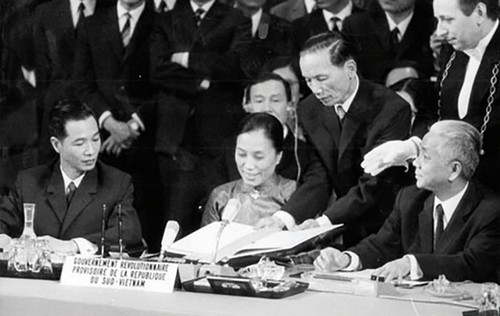 At the signing of the Paris Peace Accords on January 27, 2013 (file photo) At the signing of the Paris Peace Accords on January 27, 2013 (file photo) |
Lasting for nearly five years, from 1968-1973, the Paris negotiation on Vietnam went through 201 public sessions, 45 high-level private meetings, more than 500 press conferences, and more than 1,000 interviews. In the end, Vietnam’s young but brave diplomacy, representing a righteous voice and supported by progressive people around the world, won.
Victory of Vietnam’s diplomacy
Historical documents show that in all public joint sessions as well as private contacts during the Paris negotiations, Vietnamese negotiators did not miss any issues concerning the war in Indochina. Their arguments insisted the US army and its allies in the Asia-Pacific region withdraw from southern Vietnam and respect civil rights, basic national rights and the right to self-determination of the people in southern Vietnam.
Foreign Minister Bui Thanh Son said throughout the negotiation process, the principle of independence and self-reliance was always upheld. Advisor Le Duc Tho and the Vietnamese negotiating team effectively and creatively applied the strategy “Keeping calm to respond to unexpected changes” and at the same time turned victories on the battlefield into success at the negotiating table.
Foreign Minister Bui Thanh Son affirmed: “Mr. Le Duc Tho applied the lesson about “Keeping calm to respond to unexpected changes” that President Ho Chi Minh told Vietnamese diplomats swiftly during five years of negotiations with hundreds of fierce mind battles. Mr. Le Duc Tho firmly grasped the Party's guidelines and directions. With sharp thinking, rich experience and tactical skills, Mr. Le Duc Tho and the negotiating team excellently turned the victory on the battlefield into victory on the negotiating table. This victory is one of the pinnacles of Vietnamese diplomatic intelligence.”
Invaluable historical lessons
Fifty years after the Paris Agreement was signed, scientific studies and assessments by Vietnamese and foreign experts showed that the 1973 Paris Agreement was a landmark victory in the history of Vietnam's diplomacy. The agreement also brought about several valuable lessons with profound contemporary significance for Vietnamese diplomacy including grasping the situation and seizing opportunities. Nguyen Thi Binh,
Minister of Foreign Affairs of the Provisional Revolutionary Government of the Republic of South Vietnam from 1969 to 1975 and chief negotiator at the Paris Conference, said: “First, you need to evaluate the situation, know yourself, and know your enemy. Second, we need to seize opportunities. Third, we need a wise strategy, clearly defining the primary and the secondary. In my opinion, we were very creative in our diplomacy”
Former Deputy Prime Minister and former Deputy Foreign Minister Vu Khoan said: “This was probably the longest negotiation on ending the war in history. It leaves a lot of lessons for Vietnamese diplomacy. It is a lesson about cooperation, consistency, perseverance, and shrewdness.”
According to official documents, during the Paris negotiation, thousands of rallies and demonstrations against the war and in support of Vietnam broke out in many parts of the world, including in the United States. The anti-war and pro-Vietnam movement became a great source of encouragement for Vietnam both on the battlefield and at the negotiating table, resulting in the Paris Agreement and subsequent victory of the 1975 Spring General Offensive to liberate the south and reunify the country.
Rallying international support is a lesson for the diplomatic sector which concerns effectively utilizing external support and resources for national construction and defense. This lesson is especially meaningful to Vietnam's extensive international integration amid complicated and unpredictable challenges around the world.